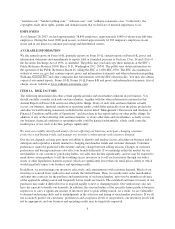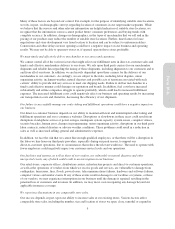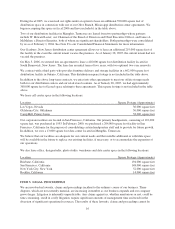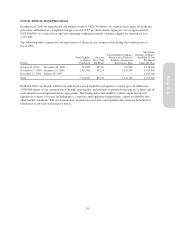Pottery Barn 2006 Annual Report Download - page 25
Download and view the complete annual report
Please find page 25 of the 2006 Pottery Barn annual report below. You can navigate through the pages in the report by either clicking on the pages listed below, or by using the keyword search tool below to find specific information within the annual report.
our data center information technology infrastructure. Accordingly, we are subject to the risks associated with
IBM’s ability to provide information technology services to meet our needs. Our operations will depend
significantly upon IBM’s and our ability to make our servers, software applications and websites available and to
protect our data from damage or interruption from human error, computer viruses, intentional acts of vandalism,
labor disputes, natural disasters and similar events. If the cost of IBM hosting and managing certain aspects of
our data center information technology infrastructure is more than expected, or if IBM or we are unable to
adequately protect our data and information is lost or our ability to deliver our services is interrupted, then our
business and results of operations may be negatively impacted.
Our operating and financial performance in any given period might not meet the extensive guidance that we have
provided to the public.
We provide extensive public guidance on our expected operating and financial results for future periods.
Although we believe that this guidance provides investors and analysts with a better understanding of
management’s expectations for the future and is useful to our shareholders and potential shareholders, such
guidance is comprised of forward-looking statements subject to the risks and uncertainties described in this
report and in our other public filings and public statements. Our guidance may not always be accurate. If, in the
future, our operating or financial results for a particular period do not meet our guidance or the expectations of
investment analysts or if we reduce our guidance for future periods, the market price of our common stock could
significantly decline.
Our quarterly results of operations might fluctuate due to a variety of factors, including seasonality.
Our quarterly results have fluctuated in the past and may fluctuate in the future, depending upon a variety of
factors, including shifts in the timing of holiday selling seasons, including Valentine’s Day, Easter, Halloween,
Thanksgiving and Christmas. A significant portion of our revenues and net earnings has been realized during the
period from October through December. In anticipation of increased holiday sales activity, we incur certain
significant incremental expenses, including fixed catalog production and mailing costs and the costs associated
with hiring a substantial number of temporary employees to supplement our existing workforce. If, for any
reason, we were to realize significantly lower-than-expected revenues or net earnings during the October through
December selling season, our business and results of operations would be materially adversely affected.
We may require external funding sources for operating funds.
We regularly review and evaluate our liquidity and capital needs. We currently believe that our available cash,
cash equivalents, cash flow from operations and cash available under our existing credit facilities will be
sufficient to finance our operations and expected capital requirements for at least the next 12 months. However,
as we continue to grow, we might experience peak periods for our cash needs during the course of our fiscal year,
and we might need additional external funding to support our operations. Although we believe we would have
access to additional debt and/or capital market funding if needed, such funds may not be available to us on
acceptable terms. If the cost of such funds is greater than expected, it could adversely affect our expenses and our
operating results.
We will require a significant amount of cash to pay quarterly dividends at intended levels and for our stock
repurchase programs.
In March 2006, we initiated a quarterly cash dividend of $0.10 per common share. In March 2007, our Board of
Directors authorized an increase in our quarterly cash dividend of $0.015 to $0.115 per common share. In
addition, our Board of Directors authorized the repurchase of up to 2,000,000 and 5,000,000 shares of our
common stock in March 2006 and August 2006, respectively. In March 2007, our Board of Directors authorized
the repurchase of an additional 5,000,000 shares of our common stock. The dividend and the share repurchase
programs require the use of a significant portion of our cash earnings. As a result, we may not retain a sufficient
amount of cash to finance growth opportunities, new product development initiatives and unanticipated capital
13
Form 10-K
























